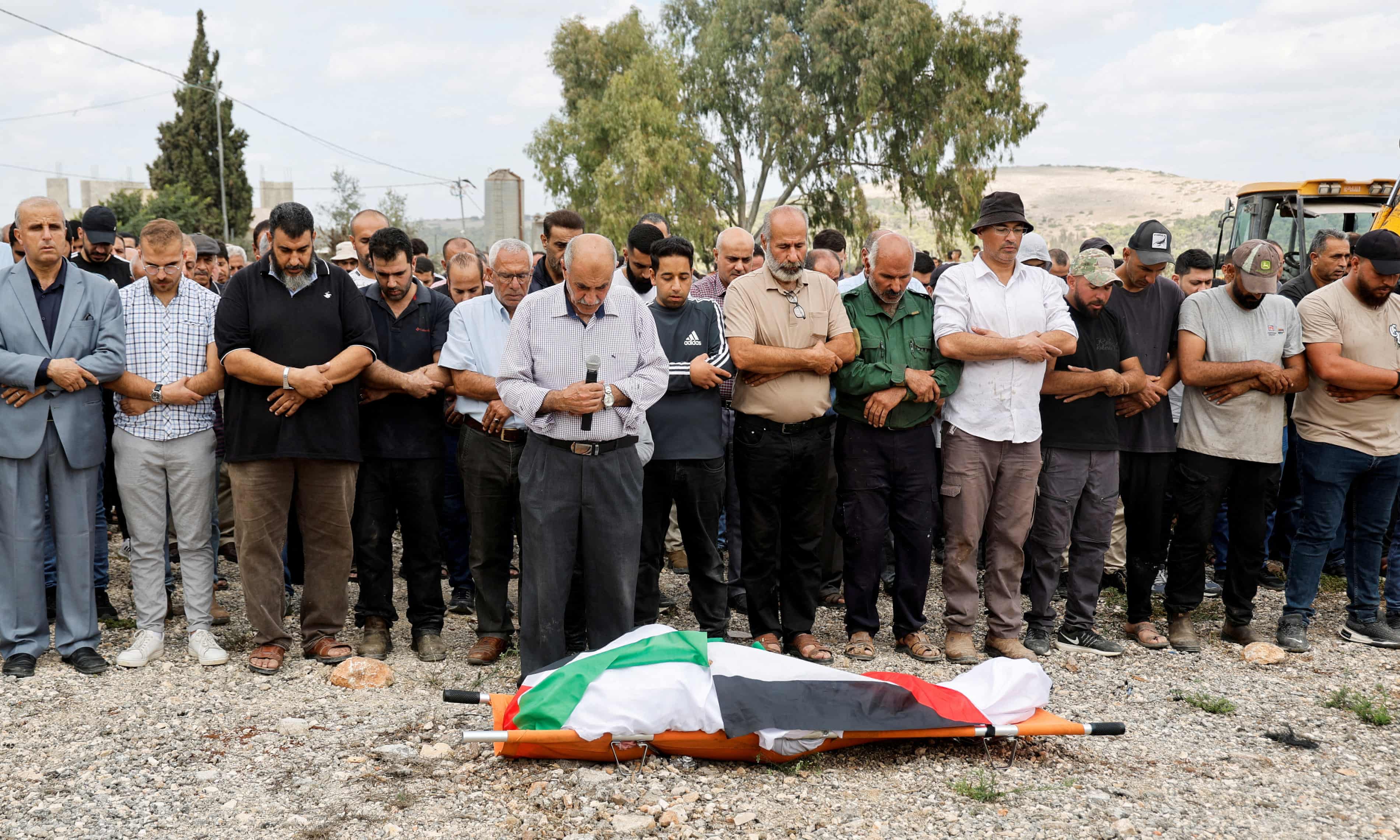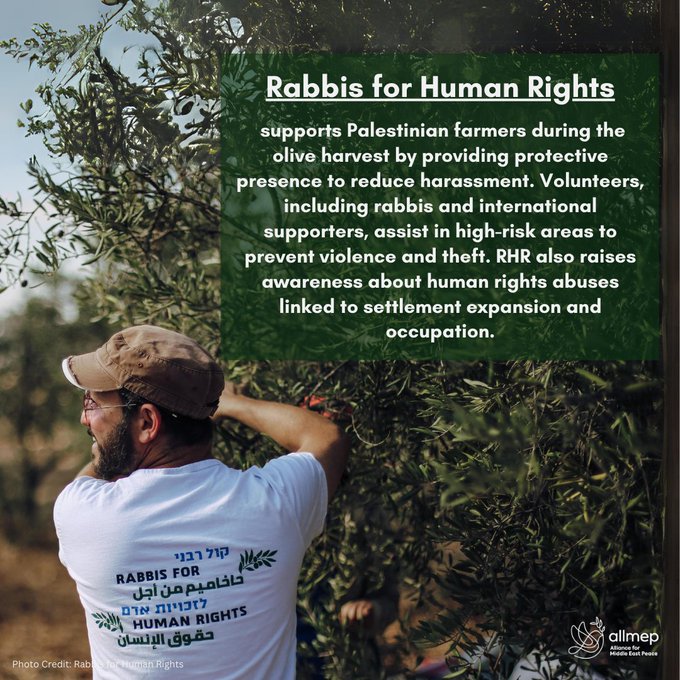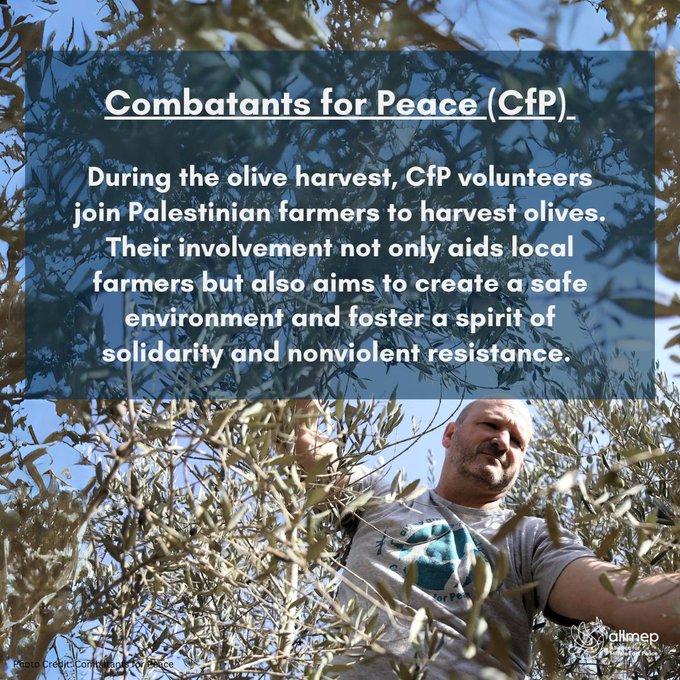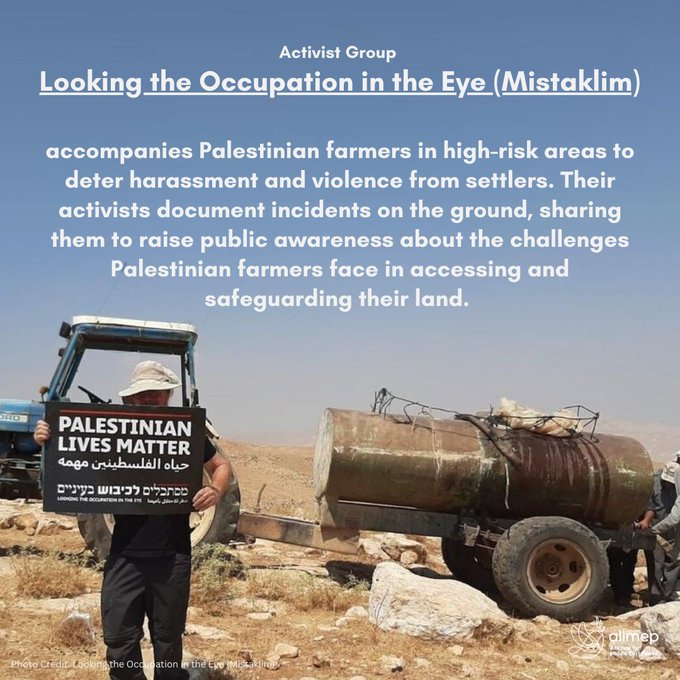
TikTok Genocide

Settlers assault olive pickers in the village of Umm Al-Rihan
Original Social Media Post
"⚡️Settlers assault olive pickers in the village of “Um Rihan” near the town of Ya’bad, southwest of Jenin, West Bank." - Source
Tags
Archivist Notes On This Video
Umm Al-Rihan Forest is located in the extreme of the West Bank, northwest of Jenin, bordering the 1967 Green Line. Its altitude reaches an average of 412 m above sea level.
Event Notes
Harassment by the settlers during the olive harvestSince the beginning of October, and the olive harvest season in Palestine, attacks against Palestinian farmers have increased. Attacks and assaults against farmers are daily occurrences in the occupied West Bank and the vast majority target farms in the governorates of Nablus, Jenin, Tulkarem, Qalqiliya and Salfit.
Olive trees are estimated to account for a third of cultivated land in Palestine and contribute up to 20% of the agricultural output.
The current olive harvest season is especially important for the Palestinians given the economic hardship caused by the war. Settlers have already used violence against harvesters, and many fear that the army won't provide adequate protection and will prevent them from accessing their lands.
Throughout this olive season, Israel's Settler/Soldier militias have been diligently
-
preventing farmers access to their lands,
-
shooting/killing farmers,
-
terror attacks, burning of homes & property,
-
destruction of olive trees,
-
theft of olive harvest.
In most cases, Palestinians were in their lands harvesting olives, in areas which even Israel's "judicial & military authorities" "permitted" Palestinian farmers access to. However, Israeli settlers & soldiers coordinated to remove Palestinians from their lands, often by force. In some cases, like Sisiya on October 18, the settlers violently attack Palestinian farmers before the Israeli soldiers intervene to expel the farmers. In Susiya, the farmers had a fresh "Israeli court order" permitting them access - to no avail. In other cases, the Settler/Soldiers terrorists simply shoot & kill Palestinian farmers, such as in the case of Hanan Abu Salameh on October 17, a 59-year-old woman who was killed while harvesting olives in Faqqua near Jenin by a soldier who fired about 10 shots at her.

West Bank olive harvest met with rising Israeli violence, says UN. Nine deaths in a week, including soldier’s killing of 59-year-old woman as she farmed, brings charges of ‘war-like’ tactics. The settlers attack, burn, and destroy. The soldiers attack and issue "military closed zones." In tandem. They work in close cooperation to prevent Palestinian farmers access to their olive harvest, imposing a new reality on the ground.
Another new phenomena across the West Bank, is that Israeli settlers now felt comfortable to steal the Palestinian olive harvest after succeeding to expel Palestinians off their lands through the use of force. Sometimes, after they steal, they burn or destroy the olive trees. This is an overlooked reality in the occupied West Bank. And the settlers are celebrating this achievement, calling for donations and supporters, hoping to expand the new reality on the ground. This has been one of the most violent Olive Harvest season. Every day, Palestinian farmers were violently prevented from reaching the olive groves, or threatened and attacked inside their villages as warning.
Chronology (ongoing)
On November 28 in Salem Village, the Israeli forces obstructed Palestinian farmers' access to their lands in Salem, east of Nablus, preventing them from harvesting olives. Soldiers detained individuals, checked IDs, and used sound bombs and tear gas against youths. They also set up an iron gate at the northern entrance and placed soil berms to block vehicles.
On November 25 Palestinian families are prevented from harvesting olives from their groves by Israeli colonial forces in the area of Sahel Turmus-Aya. Before being kicked out of their lands, farmers noticed that their olive trees bore very little fruit. Throughout this past year, the landowners were prevented from accessing their land at the hands of settlers and soldiers, thus making it impossible to tend to their trees properly. The soldiers also attacked a youngster. (according to Activestills
On November 9
Ahmad Abdullah Ghazal from the town of Sebastia, northwest of Nablus has passed away days after settlers attacked him and sprayed him with gas while he was picking olives. He did not suffer from any illness prior to this incident.
On November 8
The guard of Yitzhar settlement, along with settlers dressed in Israeli occupation forces uniforms, expelled farmers and stole olives from the lands of Burin village, south of Nablus.
Landowners returned to their orchards in Umm Nir to continue the olive harvest that had been interrupted the day before. This time, Shmuel Lusky and another settler from the illegal outpost of Ancient Susya arrived at the scene, attempting to steal the harvested olives and assaulting the harvesters.
On November 7 dozens of soldiers and police officers from the Border Police prevent harvesting in olive groves, in Um Nir, near Susya, Masafer Yatta.
On November 4 : in Burqa, Settlers invaded a Palestinian land to burn their olive trees. Two farmers defend their land by throwing stones on the settlers who are lightly wounded.
On November 2 :
- Under the protection of Israeli forces, settlers attacked farmers while they were picking olives in Qaryut village, south of Nablus.
On October 30 :
- Israeli settlers chopped off hundreds of olive trees in Qaryut near Nablus.
On October 28 :
- Israeli settlers storm agricultural lands near Ramallah and set fire to olive trees.
On October 27 :
- In the morning - a Palestinian's car is burned while picking olives near the town of Kablan, southeast of Nablus. In the evening - in the square at the entrance to Huwara, same governorate, soldiers or settlers, raided the area.
On October 26:
- In Hebron / Al-Khalil, Israeli Jewish settlers attacked a Palestinian family during the olives harvest in Hebron, stoling the olives & sheets which the family use to pick the olive.
On October 25:
- In Beit Jala area, Israeli army prevents Palestinians from harvesting olives on private land, using stun grenades at close range against activists assisting with the harvest.
- EU and allied diplomatic officials joined Palestinian youth in olive harvesting at Kufr Nimeh to show solidarity amid rising settler attacks. Since October 1st, settlers have reportedly vandalized, burned, or cut down about 600 olive trees in 15 West Bank communities. UNOCHA recorded 51 settler-related incidents affecting 57 communities. EU Statement: The EU urged Israel to protect Palestinian farmers and ensure a safe harvest, stressing that perpetrators of violence, harassment, and intimidation should be held accountable.
On October 22:
- A large groups of settlers carried out a progrom against the residents of Jalud, a village near Nablus. They set fire to homes, vandalized vehicles, killed livestock, and and physically assaulted villagers. 2 Palestinians were injured in the face and another suffered a skull fracture during the attack. Sheep were slaughtered
On october 20
- In Burqa, near Ramallah, soldiers prevented the olive harvest by using stun grenades and making threats. As the soldiers attempted to evict the locals, masked settlers armed with batons approached.
On October 18:
-
Settlers open fire and launch tear gas at residents and volunteers harvesting olives in Kafr al-Labad, east of Tulkarm
-
A settler attack on the residents in Susiya village, Masafer Yatta, one solidarity activist was injured. Since the start of the Olive Harvest, attacks have been non-stop and increasing, while soldiers watch and protect the settlers and facilitate the attacks.
-
In the middle of the night settlers snuck into olive groves in Burin, near Nablus, and stole their equipment.
-
An armed Israeli settler in IDF uniform threatens Palestinians after storming their land during olive picking in the village of Ramin, Tulkarm, West Bank.
On october 17 :
-
Hanan Abdel Rahman Abu Salama, 59, was killed by Israeli fire as she was picking olives near the security barrier in the West Bank village of Faqoua near Jenin, on October 17, 2024. The Israel Defense Forces has suspended a deputy commander in its 334th Battalion and opened an investigation. Faqoua village councilor Munir Barakat told AFP that “an Israeli in military clothing arrived at the place in a white car and fired about 10 bullets at the Abu Salama family, who were picking olives on their land".
-
Local sources reported that the colonists attacked citizens while they were attending their lands and picking olives in the village of Rojib, sprayed them with pepper gas, and forced them to leave.
-
In a related context, an Israeli colonist also attacked a citizen while he was picking olives in the village of Madama, south of Nablus, preventing him from completing his work, and forcing him to leave his land.
-
In Qusra, Israeli settlers further forced citizens to leave the olive fields, and seized a vehicle used to transport them and transport the olives after the harvest.
On October 13 :
- In Burin just outside Nablus, teenage settlers are beating olive trees and stealing crops from Palestinians.
On october 12
-
Settlers set the village of Al-Mughayyir, north of Ramallah on fire to burn down agricultural crops and olive trees. Armed settlers assault farmers and block them from harvesting olives;
-
Settler militias assault farmers during olive harvesting in Turmus Ayya, north of Ramallah
On October 5:
- in Al-Luban al-Gharbiyya (اللبّن الغربيّة), Ramallah district - Al-Bira, occupied West Bank, Hasem Salama and his family were attacked by over 50 masked and armed Israeli settlers while harvesting olives. 11 Palestinians were injured, including women and a 7-year-old child. The settlers used iron pipes, causing bone fractures and severe injuries; Salama himself suffered leg wounds and was unable to stand.
On September 28 :
Armed settlers raided our land in Tuwani, Masafer Yatta, deliberately destroying olive crop using a herd of sheep, under protection of armed settler soldiers. They detained farmers for an hour while the settlers sabotaged the olive grove.
On September 12 :
- Settlers from the Rehelim area set fire to olive trees and agricultural equipment in the village of Yatma. The fires are still burning.
UN Experts on Israeli Settler Violence Against Palestinian Farmers
On 17 October 2024, UN experts highlighted the severe challenges Palestinian farmers face during the olive harvest season in the Israeli-occupied West Bank.
Intimidation and Violence: Israeli settlers and occupation forces have escalated their attacks, severely harassing Palestinian farmers, restricting access to land, and threatening food sovereignty. 2023 saw the highest levels of violence, including physical assaults, property damage, and obstruction of access to farming areas. Many Palestinians were forced to leave their homes and lands.
Economic Impact: Due to Israeli restrictions, 96,000 dunums of olive-cultivated land remained unharvested in 2023, causing a loss of 1,200 metric tons of olive oil, valued at approximately $10 million.
Cultural and Ancestral Significance: The olive harvest is central to Palestinian culture and heritage. UN experts view Israel’s actions, including the destruction of orchards and water source restrictions, as attempts to expand illegal settlements.
The annual olive harvest is a vital economic, social & cultural event for Palestinians 🫒
It's why Irish and UE partners are joining local harvests across the West Bank as a protective presence against a rise in settler violence, vandalism & intimidation, as documented by @OCHAOPT since Oct 1st.
The Yesh Din organization reports that settlers have attacked laborers, stolen olives, and destroyed trees across the northern West Bank. Despite agreements with the Israeli military for protection, attacks continued, particularly in areas like Mughayyir and Burin. In total, Yesh Din recorded 36 violent incidents since October 3, with 24 of them preventing olive harvesting, even on lands without IDF-imposed access restrictions. In some cases, IDF soldiers and police were present but did not intervene; in others, they allegedly assisted settlers in driving laborers off the land. Palestinian farmers are only granted access to their lands twice a year, and no coordination for the 2024 harvest has been finalized. The IDF claims to be providing protection amidst increased security risks.
According to Yesh Din, the 2024 olive harvest in the West Bank was marked by severe disruptions and violence against Palestinian farmers.
a) Violence and Obstruction by Settlers and Security Forces:
- The harvest, beginning on October 15, was marred by assaults and expulsions of farmers by settlers and Israeli security forces.
- In Faqqu’a (Jenin District), soldiers shot and killed 59-year-old Hanan ‘Abd a-Rahman Abu Salameh.
- Soldiers, Border Police, and settlement Civilian Security Coordinators (CSCs) frequently prevented Palestinians from accessing their lands or failed to intervene against settler violence.
- Military closure orders barred Palestinians from large agricultural areas, blocking access to their own lands.
Failures of the Coordination Mechanism:
- The army’s “coordination mechanism,” meant to ensure safe harvests, was poorly implemented.
- Coordination notices were often given last minute, with farmers receiving only 1–2 days for harvesting, making it impossible to prepare or complete their work.
- Settlers exploited these restrictions, accessing and harvesting Palestinian lands freely, often stealing crops with soldiers present and inactive.
Violent Incidents and Crop Theft:
Between October 1 and November 15, 2024, Yesh Din documented 113 incidents of violence, harassment, or crop damage on lands from 51 Palestinian communities:
- 68 incidents: Settlers and soldiers forcibly prevented harvesting. In 70% of cases, state-armed personnel aided settlers or failed to protect farmers.
- 43 incidents: Physical violence against harvesters, including beatings and live fire, resulting in one fatality.
- 52 incidents: Theft or destruction of Palestinian property, including olive crop theft on 38 occasions.
- 12 incidents: Deliberate damage to olive trees, with hundreds of trees cut, sawed, or burned.
International Legal Obligations:
-
UN experts reaffirmed Israel’s legal duty to end the occupation and dismantle settlements as directed by the International Court of Justice (ICJ) ruling on 19 July 2024, supported by the General Assembly on 18 September 2024.
-
Provide reparations for human rights violations, return confiscated land, and allow displaced Palestinians to return. Call for International Protection:
UN experts urge for protective measures, including a foreign presence to act as a buffer between Palestinian farmers and settlers. The Special Rapporteur on the right to food will present a report emphasizing Palestinian food sovereignty at the General Assembly on 18 October 2024.
Activits and solidarity group
The Alliance for Middle East Peace (ALLMEP) is a network of over 160 NGOs conducting peacebuilding between Israelis and Palestinians.


The details for each video come from social media. None of it has been verified.
